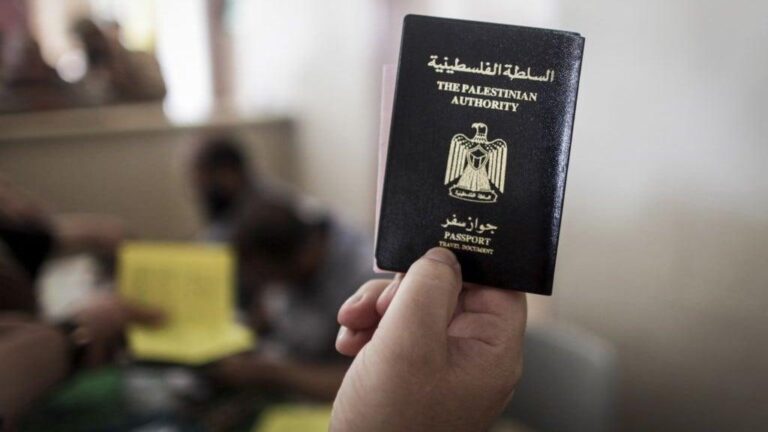The United States has reportedly suspended visa approvals for nearly all holders of Palestinian passports, according to a recent report by The Guardian. This move marks a significant shift in U.S. policy, raising concerns among Palestinian communities and human rights organizations about travel restrictions and their broader implications. The suspension is expected to affect a wide range of individuals, from students and professionals to family members seeking reunification, intensifying tensions amid an already complex geopolitical landscape.
US Halts Visa Approvals Affecting Majority of Palestinian Passport Holders
In a significant development impacting international travel, the United States has reportedly stopped processing visa applications for the vast majority of Palestinians holding passports. This unexpected suspension has raised concerns among diplomats and advocates, who highlight potential humanitarian and administrative repercussions. The halt affects travelers seeking various types of visas, including tourist, student, and work permits, effectively freezing the mobility of many Palestinians aiming to visit, study, or work in the US.
Officials have not disclosed an official timeframe for resuming approvals, further intensifying uncertainty. Observers note several possible reasons behind the decision, such as security protocols and policy reassessments. Key factors highlighted include:
- Heightened security screenings post recent geopolitical tensions
- Diplomatic negotiations influencing visa processing strategies
- Administrative challenges within US consular services
Implications for Palestinian Travel and Diplomatic Relations Explored
The suspension of visa approvals for nearly all Palestinian passport holders marks a significant shift in U.S. immigration policy, potentially altering travel dynamics and diplomatic interactions in the region. This move could severely limit the mobility of Palestinians, affecting students, business professionals, and those seeking medical treatment abroad. Many Palestinians rely on U.S. visas for educational opportunities and family reunifications, and the new restrictions threaten to deepen the sense of isolation felt by individuals and communities alike.
From a diplomatic perspective, the suspension is likely to exacerbate tensions between the United States and Palestinian representatives, complicating ongoing peace efforts and international collaborations. Analysts anticipate a range of responses including increased appeals from advocacy groups and diplomatic channels urging reconsideration. The following table outlines key potential impacts:
| Area Affected | Potential Outcome |
|---|---|
| Education | Reduced student visa issuance limiting academic exchanges |
| Medical Travel | Disruption in access to critical healthcare overseas |
| Diplomatic Engagement | Increased strain on U.S.-Palestinian dialogue and negotiations |
| Family Reunification | Delays and denials impacting family unity |
Reactions from Human Rights Groups and International Community
Human rights organizations have swiftly condemned the reported US decision to suspend visa approvals for nearly all Palestinians holding passports. Amnesty International described the move as “a blatant violation of international human rights norms,” emphasizing that it disproportionately affects innocent civilians seeking education, medical treatment, and family reunification. Meanwhile, Human Rights Watch called for immediate transparency and urged US authorities to reconsider the policy to prevent further humanitarian distress.
The international community has also voiced concern, with diplomatic representatives from the European Union and the United Nations expressing apprehension over the sweeping restrictions. The EU issued a statement highlighting the potential impact on peace and stability in the region, while the UN’s Office of the High Commissioner for Human Rights stressed the necessity of upholding freedom of movement regardless of political context. Below is an overview of key responses:
| Organization | Position | Key Concerns |
|---|---|---|
| Amnesty International | Strongly critical | Human rights violations, collective punishment |
| Human Rights Watch | Calls for reversal | Transparency, humanitarian impact |
| European Union | Expresses concern | Regional stability, impact on civilians |
| United Nations | Urges protection | Freedom of movement, humanitarian access |
Recommended Steps for Affected Individuals and Policy Advocacy Efforts
For individuals impacted by the visa suspension, immediate action is crucial to navigate these restrictions effectively. Experts advise affected persons to consult with immigration attorneys who specialize in US visa law to explore alternative pathways or exemptions that might apply to their cases. Additionally, maintaining updated documentation and records of all communications with US consular offices can support future appeals or reconsiderations. It is equally important to stay connected with community organizations that provide legal aid and advocacy support, ensuring access to timely and accurate information.
On a broader scale, policy advocacy efforts must focus on raising awareness about the humanitarian and socioeconomic impacts of these restrictions. Activists and NGOs are encouraged to engage policymakers through targeted campaigns aimed at reinstating fair and transparent visa procedures. Collaborations with international human rights bodies and leveraging social media platforms can amplify the calls for change. The table below provides a summary of key advocacy actions and their intended outcomes, serving as a quick reference for organized initiatives:
| Action | Purpose | Expected Impact |
|---|---|---|
| Petition Drives | Raise public and governmental awareness | Pressure policymakers to review current visa policies |
| Legal Action Support | Challenge restrictions in courts | Potentially overturn or soften visa suspensions |
| International Advocacy | Engage global human rights organizations | Increase diplomatic pressure on US authorities |
| Community Mobilization | Empower and unite affected populations | Strengthen collective voice and resilience |
In Conclusion
The reported suspension of visa approvals for nearly all Palestinian passport holders marks a significant development in US-Palestinian relations, with potential implications for travel, diplomacy, and humanitarian efforts. As stakeholders on both sides seek clarity and responses from US authorities, the situation remains fluid. Further updates are expected as more information becomes available and the impact of this policy unfolds.




